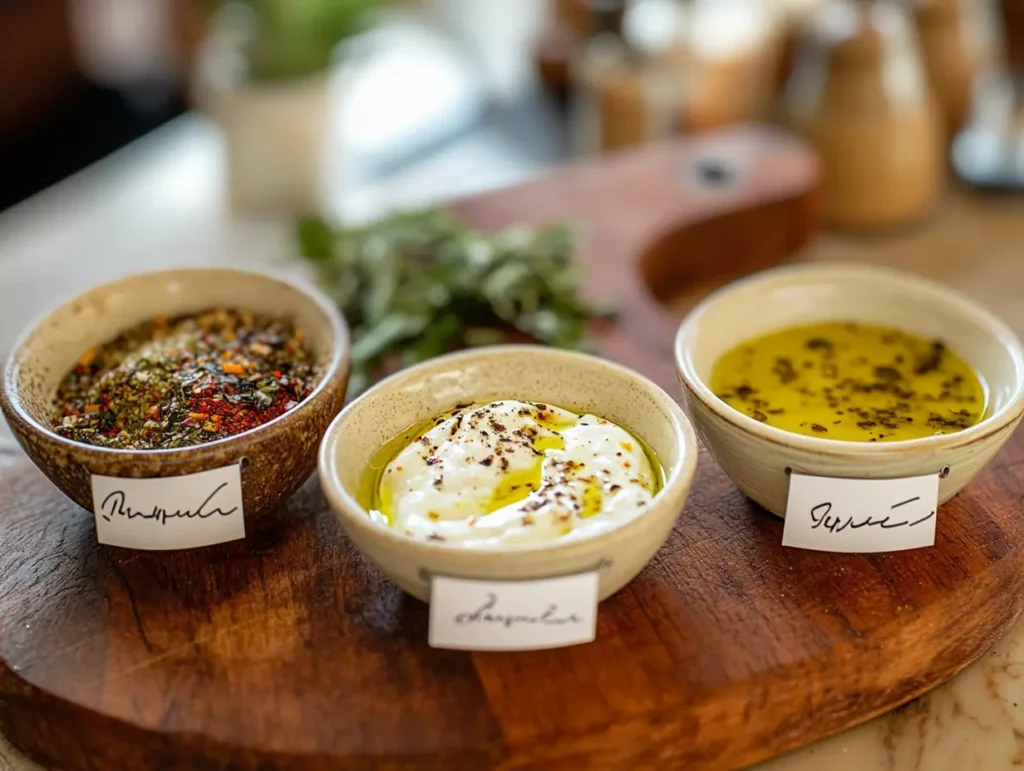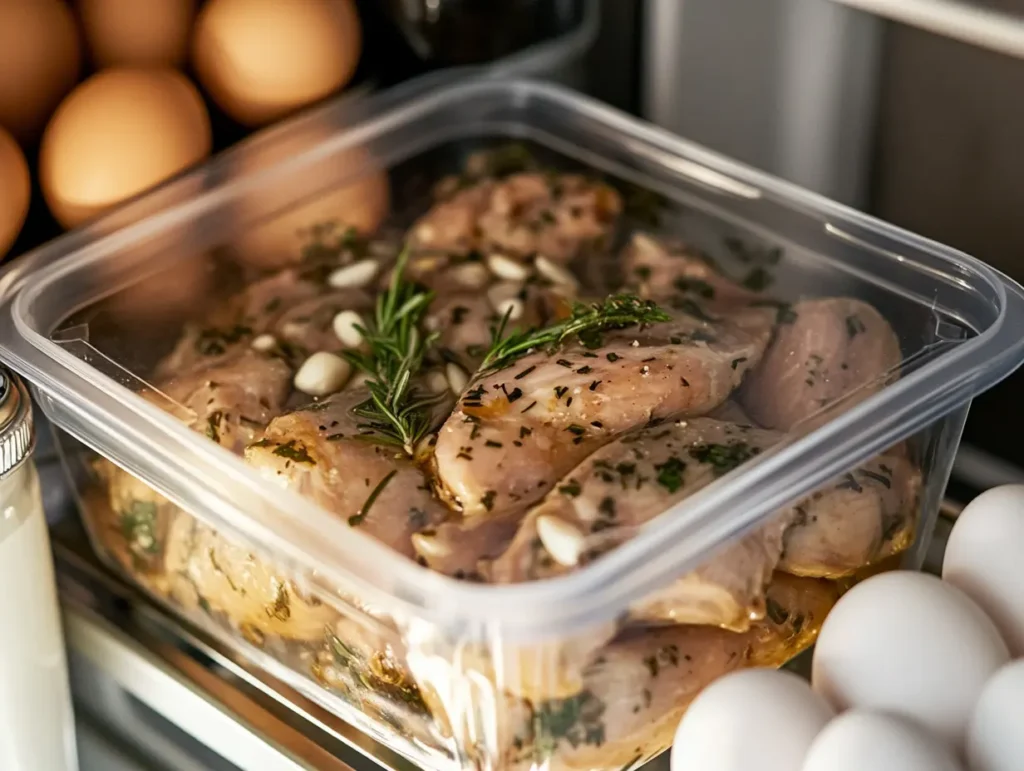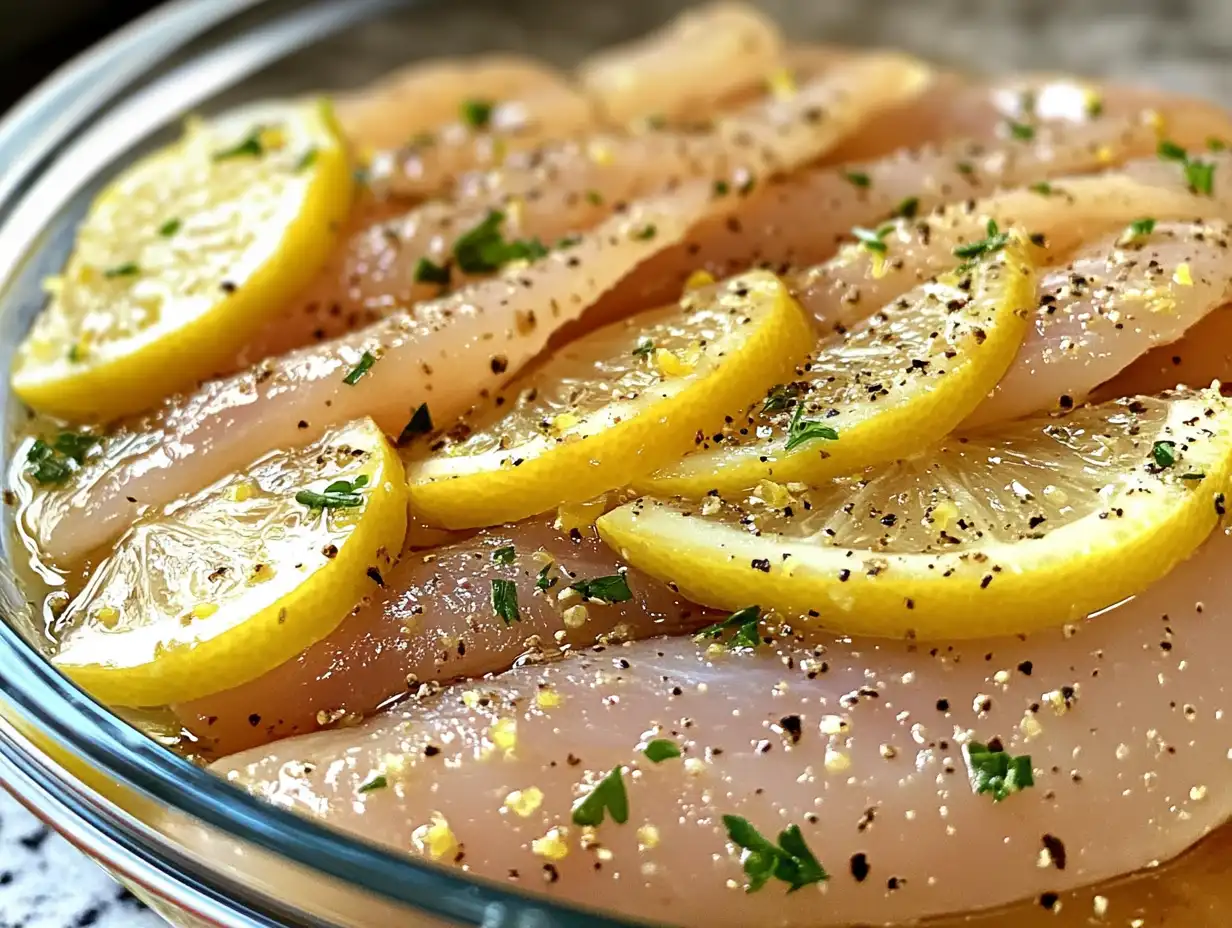How long can you marinate thin chicken breast is a question many home cooks face when looking to infuse flavor and tenderize the meat. But when it comes to thin chicken breasts, knowing the right marinating time is crucial. If you marinate for too long, it can ruin the texture; too short, and the flavor might not sink in. This article will help you uncover the perfect timing, safe practices, and a few tips to ensure your marinated chicken turns out just right.
Table of contents
Introduction to How long can you marinate thin chicken breast?
When it comes to answering how long can you marinate thin chicken breast, there’s no one-size-fits-all answer. The marinating time depends on the ingredients in your marinade and how you plan to cook the chicken. This guide will provide practical, easy-to-follow advice to help you avoid common mistakes, such as over-marinating, while ensuring the chicken remains flavorful and safe to eat.
Let’s dive right into the specifics of marinating chicken breasts, starting with understanding what makes a marinade work.
Understanding Marination
The Science Behind Marinating Chicken
Marination works by breaking down the chicken’s muscle fibers and adding moisture, resulting in juicy and flavorful meat. Ingredients like acids (lemon, vinegar), enzymes (pineapple, papaya), or dairy (yogurt, buttermilk) are the key players in this process. They soften the protein structure of thin chicken breasts, making them tender and tasty.
But hey, it’s not just about throwing in some ingredients and waiting! Knowing how much acid, salt, and oil to include—and for how long—is essential to getting it right. Thin chicken breasts, being smaller, absorb marinades faster, making them different from thicker cuts.
Benefits of Marinating Thin Chicken Breasts
Thin chicken breasts are perfect for quick marination because their lean nature allows flavors to soak in quickly. Here are some benefits you can expect:
- Quick Flavor Absorption: A shorter marination time enhances the taste without needing hours.
- Tender Texture: Properly marinated thin chicken retains its moistness.
- Reduced Cooking Time: They cook faster, making them ideal for busy schedules.
Balancing flavor and time ensures your chicken isn’t too salty, mushy, or bland. Keep reading to discover just how much time you need for that perfect marinade.
Optimal Marinating Times for Thin Chicken Breasts
Recommended Marinating Durations
For thin chicken breasts, timing is everything. Marinating them for too long can alter their texture, making the meat overly soft or even mushy. On the other hand, a too-short marination might leave them bland.
Here’s a breakdown of recommended marination times based on different types of marinades:
| Type of Marinade | Recommended Time |
|---|---|
| Acidic (lemon, vinegar) | 30 minutes to 2 hours |
| Dairy-based (yogurt) | 1 to 6 hours |
| Oil-based with mild herbs | Up to 24 hours |
Why stick to these times? Acids like vinegar or citrus juice can break down proteins too much, especially with thin cuts, resulting in a mushy texture. Always err on the side of caution and set a timer!
Effects of Over-Marinating
What happens if you leave your chicken in a marinade for too long?
- Textural Issues: Prolonged exposure to acidic ingredients can make the chicken spongy.
- Flavor Overpowering: Instead of enhancing the taste, over-marinating can dominate the natural flavor of the chicken.
- Food Safety Risks: If left unrefrigerated or marinated for several days, chicken can become unsafe to eat.
It’s essential to keep thin chicken breasts in a well-sealed container, refrigerated, and within the recommended time. By sticking to the right marination window, you’ll get tasty results every time.
Types of Marinades and Their Impact

Acidic Marinades
Acidic marinades are some of the most popular choices for marinating thin chicken breasts. Ingredients like vinegar, lemon juice, and wine can pack a tangy punch while tenderizing the meat. However, these marinades work quickly, so keep the marination time under two hours to avoid over-softening.
Popular Ingredients:
- Lemon juice
- Balsamic vinegar
- Apple cider vinegar
Ideal For:
Grilled or roasted recipes where a hint of tangy brightness complements the dish.
Dairy-Based Marinades
Yogurt and buttermilk aren’t just for desserts—they work wonders on chicken too! The mild acids and enzymes in dairy-based marinades break down proteins gently, leading to tender and juicy chicken.
Popular Ingredients:
- Plain yogurt
- Buttermilk
- Kefir
Ideal For:
Oven-baked or fried chicken recipes where a creamy, flavorful base is desired.
Oil-Based Marinades
Oil-based marinades with herbs and spices are perfect for locking in moisture and adding depth to your chicken. Since they lack strong acidic elements, they can marinate longer without the risk of over-tenderizing.
Popular Ingredients:
- Olive oil
- Fresh herbs like rosemary and thyme
- Garlic and black pepper
Ideal For:
Pan-seared or sautéed chicken where rich, herby notes shine through.
Which Marinade Works Best?
The choice depends on your recipe and cooking method. For instance, acidic marinades are excellent for light and zesty meals, while dairy-based ones create soft, melt-in-your-mouth textures. Oil-based marinades, however, offer versatile, subtle flavors suitable for various cuisines.
Whichever you choose, balance is key—too much acid or salt can overwhelm the chicken. Keep experimenting to find your favorite!
Safe Marinating Practices :How long can you marinate thin chicken breast?

Ensuring that marinating is done safely is just as important as the flavor. Following proper storage and handling practices not only keeps your food delicious but also prevents foodborne illnesses. Let’s dive into the best ways to safely marinate thin chicken breasts.
Refrigeration Guidelines
When marinating thin chicken breasts, always refrigerate them to keep the meat fresh and prevent bacterial growth. Leaving chicken at room temperature, even for short periods, can quickly make it unsafe to eat.
Key Tips:
- Store marinating chicken in the refrigerator at 40°F (4°C) or below.
- Use a sealed container or a heavy-duty zip-top bag to avoid leaks.
- Never reuse leftover marinade unless boiled for at least 5 minutes to kill any bacteria.
For long marination times (like overnight), check that your fridge maintains consistent cooling to keep your chicken safe.
Avoiding Cross-Contamination
Cross-contamination is one of the most common mistakes when handling raw chicken. It can occur when raw chicken juices come into contact with other food or kitchen surfaces.
Steps to Stay Safe:
- Use separate cutting boards for raw chicken and other foods.
- Wash your hands thoroughly with soap and warm water before and after handling raw chicken.
- Clean and sanitize all utensils, containers, and surfaces used for marinating.
- Keep the raw chicken container away from ready-to-eat foods in the fridge.
Safe Marinating Time Limits
It’s easy to lose track of time when preparing meals, but don’t leave chicken in the marinade for days. Most thin chicken breasts should not be marinated longer than 24 hours, regardless of the marinade type, to avoid safety and texture issues.
Practical Tips for Marinating Thin Chicken Breasts
Marinating thin chicken breasts may sound straightforward, but a few practical tips can make all the difference in achieving evenly flavored, perfectly cooked results. Let’s look at some foolproof tricks to simplify the process and maximize flavor.
Selecting the Right Container
The container you use for marinating can affect the outcome of your chicken. It’s important to choose materials that won’t react with acidic ingredients and allow for easy handling.
Best Options:
- Glass bowls: Non-reactive and easy to clean.
- Food-grade plastic bags: Ideal for maximizing contact between the chicken and the marinade while saving space.
- Ceramic dishes: Safe for marinating acidic ingredients, though heavier to handle.
Avoid using metal bowls unless they are stainless steel, as metals like aluminum can react with acidic marinades and alter the flavor.
Ensuring Even Flavor Distribution
Even marination ensures that every bite of your chicken is packed with flavor. To achieve this:
- Fully submerge the chicken: Use enough marinade to cover the breasts completely.
- Flip occasionally: Turn the chicken over halfway through the marinating time to coat both sides evenly.
- Trim the chicken beforehand: Remove any excess fat or uneven edges for consistent results.
Bonus Tip: Score or Pound the Chicken
Scoring (making shallow cuts) or pounding the chicken into an even thickness can help the marinade penetrate deeper and cook more evenly. Scored or pounded chicken absorbs flavors faster, reducing the required marinating time.
FAQs about How long can you marinate thin chicken breast?
When marinating thin chicken breasts, common concerns often arise about timing, safety, and methods. Here are answers to some of the most frequently asked questions.
How long is too long to marinate chicken?
Marinating chicken for too long can lead to undesirable textures, especially with acidic marinades. Thin chicken breasts should ideally not marinate for more than 24 hours, and acidic marinades should be limited to 2 hours. Over-marinating can make the meat mushy and unappetizing.
Can you marinate chicken overnight?
Yes, you can marinate thin chicken breasts overnight, provided you use a mild or oil-based marinade. Avoid keeping the chicken in highly acidic marinades for that long, as the acids can break down the proteins excessively.
Does marinating chicken make it tender?
Absolutely! Marinating with ingredients like yogurt, buttermilk, or acidic elements can help tenderize chicken by breaking down proteins. Thin chicken breasts, in particular, benefit from quick, efficient marination.
What happens if you marinate chicken too long?
When left in a marinade for too long, chicken can become overly tenderized, resulting in a texture that is spongy or mushy. This is especially true with citrus or vinegar-based marinades, which act quickly on the meat.
Is it safe to marinate chicken at room temperature?
No, it is unsafe to marinate chicken at room temperature. Bacteria multiply rapidly between 40°F (4°C) and 140°F (60°C). Always refrigerate chicken while it marinates to ensure food safety.
Can you reuse chicken marinade?
You should not reuse chicken marinade without cooking it first. Leftover marinade can harbor harmful bacteria from raw chicken. If you wish to repurpose it as a sauce, bring the marinade to a boil for at least 5 minutes to kill any bacteria.
Conclusion : How long can you marinate thin chicken breast?
How long can you marinate thin chicken breast ultimately depends on the type of marinade, but it’s clear that timing and safety are key factors in achieving the best results. Whether you’re using a tangy acidic marinade or a rich, creamy yogurt base, thin chicken breasts require less time to soak up flavors compared to thicker cuts. Keeping marination time within the recommended range and following proper food safety practices ensures your chicken is not only tasty but also safe to eat.
By selecting the right container, flipping the chicken for even coverage, and sticking to safe refrigeration guidelines, you can elevate your cooking game without breaking a sweat. Plus, with the answers to common questions about marination, you’re now equipped to handle chicken preparation like a pro.
Remember, marinating is an art as much as it is a science. Experiment with flavors and enjoy the process, but always prioritize food safety for the best experience.
